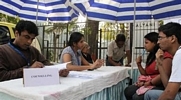Universality of the Islamic Ummah
Universality of the Islamic Umma
The Islamic Umma is a socio-economic-political free consociation of Muslims. It is not restricted to time, place or race. It includes all men and women, on equal basis, who choose freely and wilfully to accept the idea of one and indivisible eternal God, creator of the universe. The concept of Islam is founded on the bases of profession of faith in one God.
A Hadith ( dictum), denoting this sense, is ascribed to Muhammad:
‘Whosoever says: "I bear witness that there is no god but God", has entered Islam.'
Thus membership of the Islamic community is tied to this condition. One is not born as a Muslim; he becomes a Muslim by confession. In the same way it is argued that a Muslim who chooses to leave freely the Islamic community can do so by simply denying his Islam.
Characteristics of the Islamic Umma
The Islamic Umma is characterised by the homogeneity of its members. It is not a society, where heterogeneity is the main characteristic, nor is it a state whose people are confined by geopolitical boundaries.
Relations among Muslims are based on brotherhood, solidarity, equity and cooperation where they submit themselves to God and abide by His law. Citizenship and subjugation to the state and rulers, whether the one man ruler are alien to Islam for responsibility is restricted to God.
A second characteristic of the Umma is to take a middle way between extremes. The Umma maintains a balance between the individual model and the communal model. In the individual model all emphasis are concentrated on the individual. The rights and benefits of the individual are the foundation on which the laws of the society are based.
The function of norms, mores and laws in such a model are to serve to protect and promote the interests of the individual, e.g. the capitalist system. In the communal model the individual is sacrificed for the community. The individual is subservient to the community. He serves the interests of the community. He is a mechanical part of the state machine. The state decides his aims, and his way of living.
In such a model the laws and norms favour the interests of the community to the interests of the individual, e.g. the socialist system.
The Middle Way Syndrome
The Islamic Umma is founded on the middle way system. In the Qur'an we read:
‘And thus have we made of you an Umma justly balanced.' 2: 143
Exegetes refer in their interpretation of this verse to a middle way between the excess in materialism (ascribed to Jewish Scriptures) and the spiritual life perspective (ascribed to Christian Scriptures).
Other interpretations refer to shunning extremes of behaviour. This idea is expressed in avoiding excess of eating and drinking:
‘Eat and drink but avoid excess, God does not love those who excess.' 7: 31
Middle Way Economic System
The Qur'an prescribes a canonical law in economics based on shunning extremes of extravagance and niggardliness. This law regulates the economic relationships among Muslims. The management of wealth should be applied in a middle way:
‘Make not your hand tied to your neck (like a niggard's), nor stretch it forth to its utmost reach, so that you become blameworthy and destitute.' 17: 29
Worldly Possessions are Provided by God
Worldly wealth and possessions in Islam serve the Muslim in seeking the hereafter. Although the Muslim devotes his life seeking eternal felicity he ought not forget his portion in this world:
‘Seek with the wealth which God has bestowed on you the abode of the Hereafter nor forget your portion in this world.' 28: 77
Temporal goods are transitory and illusionary serving the favour bestowed in the hereafter:
‘You look for temporal goods of the earthly world; but God looks to the (goods) of the Hereafter.' 8: 67
According to Islamic outlook the good of man lies in belief in one God and performing righteous deeds.
Doing Good and Shunning Evil
The Qur'an addresses the Islamic Umma in the following terms:
‘You are the best of peoples evolved to mankind, enjoining what is right, forbidding what is wrong and believing in God.' 3: 110
This is contrasted with the evil doers who do not believe in God:
‘Those who disbelieve, among the People of the Scriptures and the idolaters, will abide in fire of hell. They are the worse of created beings. Those who believe and do good works are the best of created beings.' 98: 6-7
Allegiance only to God
Muslims have allegiance only to God. Worship and obedience is due to God and the law of God. Muslims are free from any allegiance to anything else.
The individual Muslim actualizes himself fully only within the boundaries of the Islamic Umma. No other entity of people can give the Muslim this full self-actualization. In the Islamic Umma the Muslim fully practices his rights and obligations. The Muslim's first objective is to abide by the commands of God representing his ultimate good.
As a socio-politico-economic entity the Muslim fulfils his activities in these domains.
Muslims Living outside the Umma
Muslims living within non-Muslim communities have very limited scope to actualize their religion but they appertain to the Umma. For Islam is not an individualistic religion but a social one ( Muslims are not limited only to the five pillars of Islam namely to bear witness of one God, to practice prayers, fast one month, pay alms-giving and go on pilgrimage). They have to submit themselves to the law of the hosting body that are different from Islam.
As a socio-economic and political entity the sources depicting the Umma defines the rights and obligations of Muslims within the four dimensional relation of man.
In order to preserve Islam in its ideal structure and form every Muslim ought to abide by Islam.
Any infringement on these laws by individual Muslims or sections of the Umma may very well lead to disequilibrium and disharmony of the totality of the Umma.
Although Islamic law comprising of the laws of what is forbidden and what is to be applied, it embodies a comparatively small body of rules where the freedom of the individual as well as of the group is predominantly conserved. Few penal laws for example are prescribed (six penal corporeal punishments) and fewer still are prescribed in terms of social, economic and political actions.
The Islamic Umma is not a rigid, forced type of belongingness upon Muslims. But rather it is in the interest of the Muslim himself and ultimately the interest of the entire Umma to comply by Islamic law (Shari'a). Exclusion of the Islamic Umma is simply done by the free choice of the Muslim to denounce his, or her, faith in Islam. Neither reproach nor punishment for this is mentioned in the Qur'an.
The person who turns away, according to the Qur'anic text, from Islam is held responsible for his act only by God on the Day of Judgement.
The Islamic Umma today is in a fractional state, torn up to pieces resulting in a weak position. It is far away from modernity and lag behind the new world.
This is because Muslims have abandoned their faith. Their interest has shifted from devotion to God and implementing His law yo indulging in the benefts and attractions of worldly life.
They left the worship of God and worshipped this world.



